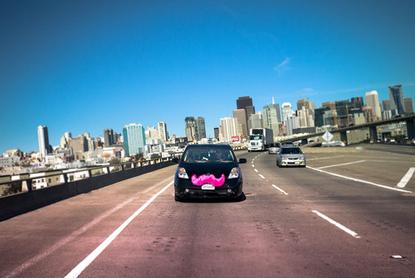Lyft to pay $300,000, make insurance changes in settlement with New York
- 19 June, 2015 03:12

A Lyft car on the road in San Francisco
Lyft has agreed to pay the state of New York $300,000 to settle claims that it is running a for-hire livery service in violation of state and municipal laws.
The agreement comes just under a year after the company was sued by New York State Attorney General Eric Schneiderman and is the latest in a string of legal rulings and agreements that are slowly bringing regulation to the so-called "sharing economy."
The original complaint was filed just four months after Lyft began providing service in Buffalo and Rochester and centered around allegations that Lyft failed to require its drivers to hold commercial licenses, carry adequate insurance and comply with local for-hire licensing rules.
The company was approached by the attorney general's office regarding its service and the lawsuit was triggered when Lyft refused to delay its launch in the Brooklyn and Queens boroughs of New York City on July 11.
The consent order reached with New York State compels Lyft drivers in the state to have insurance policies issued by New York-authorized insurers. The order also requires that while drivers have the Lyft app turned on, the insurance must cover the entirety of any ride they provide. Lyft has also consented to not offer, sell nor provide any insurance policy that doesn't comply with state law.
Lyft has also agreed to comply with local and state laws governing for-hire car services and to provide at least three weeks notice of plans to launch service in new areas to the attorney general and other state officials.
Schneiderman's office hasn't been afraid of taking on "sharing economy" companies.
Last year, his office forced Uber to limit its surge pricing during times of natural disaster, and forced Airbnb to hand over details of its hosts in the state.
In a statement outlining Thursday's settlement, Schneiderman said he wasn't anti-innovation but that new services needed to operate within laws and regulations that protect consumers and provide fair competition.
"Today's agreement enables Lyft to grow and prosper within the bounds of state and local regulations, while the penalties imposed send the message that companies that attempt to skirt the law will be held accountable," the statement said.
Martyn Williams covers mobile telecoms, Silicon Valley and general technology breaking news for The IDG News Service. Follow Martyn on Twitter at @martyn_williams. Martyn's e-mail address is martyn_williams@idg.com

